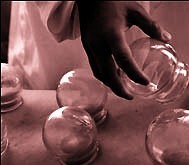With conventional medicine no longer an alternative, the alternative is now mainstream
 BAGHDAD, Iraq - Conventional medicine is a mess in Iraq, but business is booming for the Hijamma man.
BAGHDAD, Iraq - Conventional medicine is a mess in Iraq, but business is booming for the Hijamma man. Doctors have fled the country, and others have been assassinated - a U.N. report says at least 102 have been killed, with 250 more kidnapped. Sunnis are afraid to go to hospitals in Shiite neighborhoods. There hasn't been a new hospital built in Baghdad since 1986.
But in the Inbaryeen district of northern Baghdad, Ammar Mohammed Shubbar's office is crammed with people seeking his help. Shubbar practices the ancient craft of Hijamma, or cupping. In 21st-century Baghdad, this ancient medical skill, long tied to Islamic tradition with a history in Africa and ancient Egypt, has grown more popular out of necessity.
Using small glass-like jars and a surgical knife, Shubbar makes small cuts in one of 123 areas of the body, depending on his patients' complaints: high blood pressure; blood sugar; migraines; back, hand or leg pain; and even some conditions of sterility.
His patients swear by him. "Honestly, all the doctors and their medicine didn't help me much," said Ghazi Salmamn, 51, who suffers from high blood pressure. "I came here. I did the Hijamma, and the second day I really felt better, and there was a great change."
Unlike the practitioners of more traditional medical treatments, Hijamma men like Shubbar aren't heavy on academics. His training has been on the job, starting when he was 15 in the shop that used to be his father's.
Now at the grand age of 23, Shubbar is known to his patients as the sayyed, an honorific reserved for the grandsons of the prophet Muhammad.
He can tell how to begin simply by looking at a person's back. He works from 8 a.m. until 1 p.m. and from 3 p.m. until 7 p.m. One treatment costs the equivalent of about $1.50.
Shubbar's tools are simple: two glasses and a medical knife. When he chooses a spot, he burns a small piece of paper inside one of the glasses and puts it on the man's back (women are permitted to have Hijamma performed on them, but only by other women).
The burning uses up the oxygen in the glass and creates a small vacuum that pulls blood near the skin's surface. After several minutes, he takes off the glasses and uses the knife to slice six to eight small cuts in each spot. The blood, which he calls "spoiled," starts to ooze, and he moves around to other places on the back. He cleans the wounds with an antiseptic and bandages them.
Shubbar said 10 places on the human body offer the best places to work: the head, either side of the neck, two spots in the middle of the back, the lower back and other positions on the legs.
"The man doesn't feel any pain; in fact, he feels better the next day," Shubbar said.
In the United States, his brand of medicine would be considered alternative. But in Baghdad, the threat to medical workers and their patients is so great that modern treatment isn't much of an alternative anymore.
Read the rest at the San Jose Mercury News

<< Home